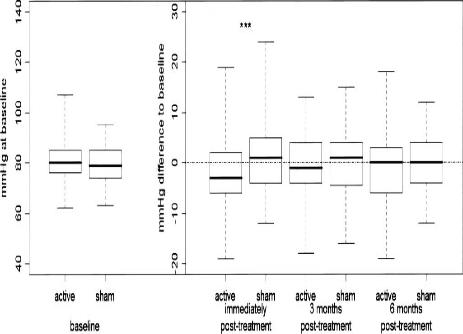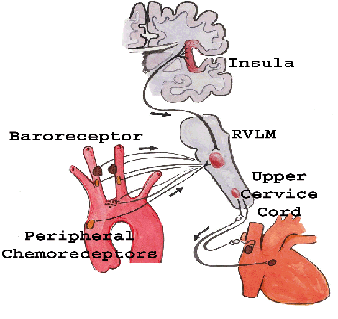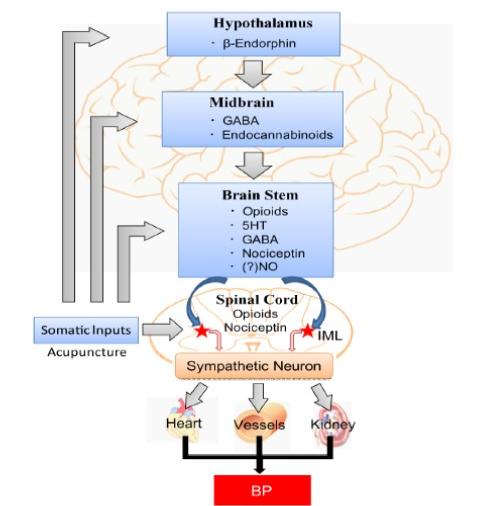Acupuncture for Hypertension
Introduction
Hypertension is the most frequent cardiovascular disease, affecting roughly one third of the adult population of America. Current pharmacologic approaches to hypertension are through affecting myocardial contractility, chronotropic, vascular tone, salt and water retention. All of these pharmaceuticals not only partially effect requiring treatment, but also are costly, fraught with compliance problems, and accompanied by unwanted side effects. Lifestyle changes such as weight loss, salt intake restriction, and exercise are other approaches to help lowering high blood pressure, but it is so difficult to achieve and even more difficult to maintain. Acupuncture have been used for treat hypertension for many years. During recent two-decade, rapidly increased medical researchers have provided many scientific evidences that acupuncture is a better support therapy for hypertension. Acupuncture with medication together can achieved a better therapeutic result for lowing blood pressure to the patients with hypertension then using medication alone.

Clinic trails for effect of acupuncture on hypertension
To determine the efficacy of acupuncture for hypertension, a review studied 23 clinic trials involved 1788 patients with hypertension. Two trials of those revealed that acupuncture as an adjunct to medication was more effective on reducing systolic and diastolic blood pressure, compared with sham acupuncture plus medication. Four trials of those also showed acupuncture combined with medication was superior to medication on efficacy. 17 clinic trials involved in 1473 patients with hypertension showed that acupuncture alone did not have significant effect on reducing systolic and diastolic blood pressure compared with medication alone. No adverse events were reported in those clinic trails.
Other review studied 8 databases involved 15 systematic reviews. They found that acupuncture combined with medication was better in reducing both systolic blood pressure and diastolic blood pressure, compared with medication alone. Acupuncture was more effective in reducing systolic blood pressure and diastolic blood pressure, compared with sham acupuncture plus medications. No serious adverse effects were reported.
To further evaluate the efficacy and safety of acupuncture therapy for patients with hypertension, a review analyzed 30 clinic trials involved in 21007 patients with hypertension. The pooled results demonstrate that acupuncture plus anti-hypertensive drugs are better than anti-hypertensive drugs alone at reducing systolic and diastolic blood pressure. The same result was observed for pooled data from experiments that compared acupuncture plus medication to sham acupuncture plus medication at reducing blood pressure. However, there is no difference between acupuncture alone and antihypertensive drugs alone in the effect on lowering blood pressure.
In conclusion, most clinic trials provided evidence that acupuncture is an adjunctive therapy to medication for treating hypertension. However, the evidence for acupuncture alone to lower blood pressure is still insufficient.
Independent studies
To understand how long effect of acupuncture on lowering blood pressure maintains, a study investigated 160 outpatients with uncomplicated arterial hypertension. The patients were divvied two groups: one group received a 6-week course of active acupuncture and other group did nor received acupuncture as sham control. 78 % of them were receiving antihypertensive medication. The study monitored 24-hour ambulatory blood pressure levels after the treatment course and 3 and 6 months later. 140 patients finished the treatment course. There was a significant (P<0.001) difference in posttreatment blood pressures adjusted for baseline values between the acupuncture group and sham acupuncture group at the end of treatment. In the acupuncture group, mean 24-hour ambulatory systolic and diastolic blood pressures decreased significantly after treatment by 5.4 mm Hg and 3.0 mm Hg respectively. However, mean systolic and diastolic blood pressures returned to pretreatment levels in the acupuncture treatment group at 3 and 6 months. The figure showed the plots of the distribution of average 24-hour ambulatory diastolic blood pressure in active and sham groups at baseline (left) and of the changes vs baseline in both treatment groups during the study period (right).

A case report described using acupuncture treatments for a patient with hypertension who could not tolerate the side effects of the antihypertensive agents. The patient was 56-year-old man with initial blood pression of 160/100 mm Hg. He started taking levamlodipine 5 mg once daily in March 2011. His blood pressure remained the same, but he developed side effects such as flushing and palpitations. He was switched to irbesartan 150 mg once daily in July 2012. His blood pressure slightly reduced to 140/85 mm Hg but he had side effects of diarrhoea, fatigue and decreased sexual function. The patient denied a family history of alcohol. The patient received a total of 60 sessions of acupuncture treatment over 12 weeks. Each acupuncture treatment session was 30 min. During 12-week treatment period, patient’s blood pressure decreased in the first 3 weeks, and slightly increased in weeks 4 to 7 and then gradually fell to a satisfactory level of 130/80 mm Hg. The antihypertensive drug side effects such as diarrhea, fatigue and impotence completely disappeared. The acupuncture was stopped at 12 weeks because he no longer had side effects from the antihytertensive drugs and he decided to return to work. The patient continued to monitor his blood pressure at home. The average blood pressure was 125-135/75-85 mm Hg. After 7 months, the patient’s blood pressure rose to 160/95 mm Hg in the afternoon and he resumed taking antihypertensive medicine. This case report suggested that acupuncture is a good choice therapy for the patient who cannot tolerate the side effects of antihypertensive agents.
Mechanism of acupuncture for lowing blood pressure
A nature research paper explored the mechanisms of acupuncture lowers blood pressure in hypertension by using rat animal model. The rat’s hypertension was induced by cold exposure for six weeks. Electrical acupuncture was applied for 30 min twice weekly for five weeks while sham was conducted with the same procedures except for no electrical stimulation. Elevated blood pressure was reduced after six sessions of electrical acupuncture and remained low 72 hrs after electrical acupuncture in 18 rats, but not in sham control rats (n = 12) and untreated rats (n = 6). The mRNA levels of preproenkephalin in the rostral ventrolateral medulla (rVLM) was increased in acupuncture rats (n = 9) after treatment 72 hrs, compared to the sham control (n = 6), untreated rats (n = 6) and normotensive control animals (n = 6). Block rVLM pathway by microinjection of opioid receptor antagonist ICI 174 and 864, into the rVLM partially reversed electrical acupuncture’s effect on elevated blood pressure in acupuncture treatment rats (n = 4). The rostral ventrolateral medulla (RVLM) is a major node of the brain network that generates Sympathetic nerve activity, which is moderately elevated in essential hypertension. These data suggest that acupuncture reduce blood pressure by increasing enkephalin in the rVLM.


References
1. Hao Chen, Fei-Er Shen, Xiao-Dong Tan, Wen-Bo Jiang, Yi-Huang Gu, Efficacy and Safety of Acupuncture for Essential Hypertension: A Meta-Analysis, Med Sci Monit, 2018 May 8;24:2946-2969.PubMed
2.Huimin Zhao, Dan Li , Yuling Li , Ying Yang , Yueting Liu , Jie Li , Jing Mao, Efficacy and Safety of Acupuncture for Hypertension: An Overview of Systematic Reviews, Complement Ther Clin Pract, 2019 Feb;34:185-194.PubMed
3.Xiao-Feng Zhao, Han-Tong Hu, Jia-Shen Li, Hong-Cai Shang, Hai-Zhen Zheng, Jian-Fei Niu, Xue-Ming Shi, Shu Wang,Is Acupuncture Effective for Hypertension? A Systematic Review and Meta-Analysis, PLoS One, 2015 Jul 24;10(7):e0127019.PubMed
4.Frank A Flachskampf, Joachim Gallasch, Olaf Gefeller, Junxue Gan, Juntong Mao, Annette B Pfahlberg, Alois Wortmann, Lutz Klinghammer, Wolfgang Pflederer, Werner G Daniel, Randomized Trial of Acupuncture to Lower Blood Pressure, Circulation, 2007 Jun 19;115(24):3121-9.PubMed
5.Lili Zhang, Pengfei Shen, Shu Wang, Acupuncture Treatment for Hypertension: A Case Study, Acupunct Med, 2014 Feb;32(1):73-6.PubMed
6.Juan Li, Mingsheng Sun, Jing Ye, Yuxi Li, Rongjiang Jin, Hui Zheng, Fanrong Liang, The Mechanism of Acupuncture in Treating Essential Hypertension: A Narrative Review, Int J Hypertens, 2019 Ma 7;2019:8676490.PubMed
7. Min Li, Stephanie C Tjen-A-Looi, Zhi-Ling Guo, John C Longhurst, Repetitive Electroacupuncture Attenuates Cold-Induced Hypertension Through Enkephalin in the Rostral Ventral Lateral Medulla, Sci Rep, 2016 Oct 24;6:35791.PubMed
